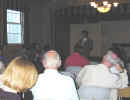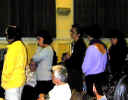Everybody dance
june 5, 2000. Every year at the beginning of the summer,
the citizens of San Francisco engage in an intricate
gavotte. Bureaucrats bow and scrape; petitioners twirl and
curtsey. It’s known as the Budget Process. On one level,
it presents the American democratic system at its finest —
and its messiest.
The musicians have once again begun to
tune their instruments. Last week Our Mayor presented his
budget to the populace at large. The denizens of City Hall
began to limber up, preparing to righteously defend requests
for increases and enter into tooth-and-nail battles to
prevent cuts. Essentially a status quo budget in a period of
burgeoning prosperity, the city departments will actually
lose ground by standing still.

Finance Committee chair Leland Yee moved
the process outside Civic Center confines, traveling to
every corner of the city to discuss the forthcoming
deliberations with We-the-People. In this city of unabashed
diversity, every district hugs its own interests close to
its bosom. Yee did his homework, consulting with local
leaders to determine which issues were dear to their
neighbors’ hearts and bringing experts along who could
expound on them. For even as seasoned pol as Yee, these
hearings must be eye-openers, for one rarely receives such a
thorough overview of day-to-day concerns.
The final two public meetings, held back
to back, offered lessons in contrast. Tuesday, May 30, about
70 people gathered in Horace Mann Middle School, in the
heart of the Mission. The meeting in the auditorium recalled
back-to-school nights everywhere, with speakers positioned
in front of a brightly decorated stage, addressing an eager
group of adults and children. In addition to Yee, three —
count them! — three police officers spoke, along with
Maggie Donahue of Human Services. Many members of the
audience wore earphones, so that a simultaneous translator
could guide Spanish-speaking listeners through the
proceedings. The Mission is nonprofit heaven, and many in
the audience wore the slightly frazzled, friendly air of
service providers, greeting one another like alums at a
college reunion.

During the public comment period, a line
of people stretched from the microphone all the way down the
center aisle to the back of the room. The room resonated
with a sense of urgency. Said Matt Brown of St. Peter’s
Housing Committee, "The mayor insists that we should
set aside a portion of our funds for a rainy day. Let him
look outside. It’s pouring!" Familiar voices raised
familiar subjects — Brown, Jennifer Friedenbach from the
Coalition on Homelessness, Riva Enteen from the National
Lawyers Guild — in an ongoing fight against the three
demons of homelessness, poverty, and inadequate health care.
But most of the speakers were private citizens, drawn by a
private need to make a public official understand the
importance of threatened institutions in their lives.
Gratitude and anguish mingled in their accounts of mentally
disturbed children who had found stability in the Mission
Family Center and acutely ill patients who had received care
at SF General, two understaffed facilities facing further
cuts in services.
Wednesday, May 31, Yee climbed the hills
to meet with folks living west of Twin Peaks. Here, too, the
official speakers gathered in front of a stage: for decades
Miraloma Clubhouse has been a venue for amateur
performances. In response to local concerns, three — count
them! — three representatives from Rec and Parks attended,
along with Deputy City Librarian Susan Hildreth and Maggie
Lynch from MUNI. They addressed an audience of about 30
informed and opinionated people who confidently cited names
and numbers to support every question they raised.
Although issues of poverty remained far in
the background, these people echoed their Mission
counterparts’ sense that the city isn’t working. San
Francisco has long ignored the western districts when
handing out goodies, and the City Hall representatives were
forced to endure a litany of complaints about potholes,
unusable parks, and reckless bus drivers — basic
infrastructure problems that average citizens assume their
tax dollars are meant to fix. What’s a good politician to
do under the circumstances? Provide sympathy, promise
changes, and offer follow-up information. The evening
elicited many vows of strict accountability.
In any other city, such a display of civic
responsibility by both office holders and voters would merit
front-page coverage in the dailies. Here, we take it for
granted that citizens will speak out intelligently and be
heard patiently. But this month’s dance is surely
accompanied by some rather energetic maneuvering offstage,
and that’s interesting.
Lacking privileged knowledge, I can only
speculate. I wonder if you have reached the same
conclusions.
For the past three years, the budget
hearings have had a shadow, a parallel process initiated
outside of and in opposition to the official one. It’s
called the People’s Budget. No pie-in-the-sky
spendspendspend program, this proposal is a respectful
attempt by people involved in the city’s daily functions
to find an alternative to official approaches that they
consider failures. They take seriously the Board of
Supervisors’ declaration of support in 1998 for the
Universal Declaration of Human Rights, including the clause
that reads, "Everyone has the right to a standard of
living adequate for the health and well being of himself
[herself] and his [her] family, including food, clothing,
housing, medical care and necessary services." Sounds a
bit like the flower children calling their federal parents
to task for ignoring the basic strictures of the
Constitution.
Three years ago, the People’s Budget
Collaborative began as a small coalition of service
organizations. Today it includes more than 40 groups,
ranging from the Coalition for Ethical Welfare Reform to the
US PROStitute Collective. Last year its active involvement
in the city’s budget hearings not only publicized
overlooked needs but actually pushed the solons toward
beneficial changes. This year it has already entered the
arena, with representatives visibly present at the
neighborhood meetings. This year its message is no longer
new. This year its reception appears to be warmer than ever
before.
But its message is not floating in a
vacuum. It has sailed into the middle of a new political
configuration where local politics radiate significance: it
has managed to land smack dab between last year’s mayoral
election and this fall’s district elections. Suddenly,
neighborhoods have become genuinely important. The time-old
tradition of center-peripheral struggle will soon play
itself out in our polling places. In the San Francisco of
tomorrow, the neighborhoods can achieve genuine power if
they are willing to collaborate; but if the politics of the
center can keep them divided, they will once more be
relegated to the role of traditional totems requiring
occasional ritualistic obeisance.

You can’t go home again, but perhaps you
can fight City Hall. The weeks to come will tell if the
old-style Democratic County Central Committee’s hold on
voting behavior has loosened, ushering in a slew of new
elected officials to roil bureaucratic waters. But a
preliminary match is underway right now, in the battle
between the two budgets.